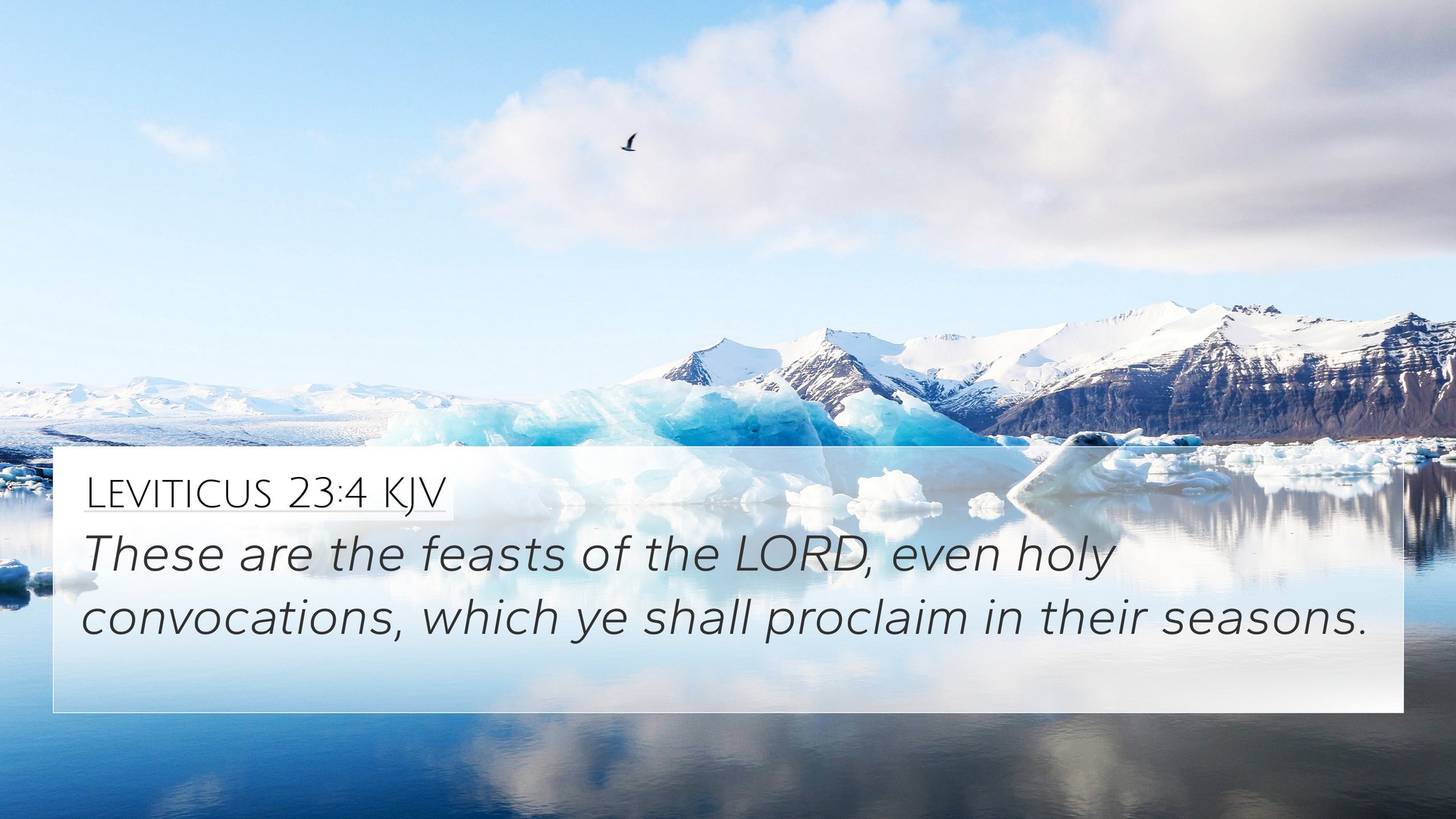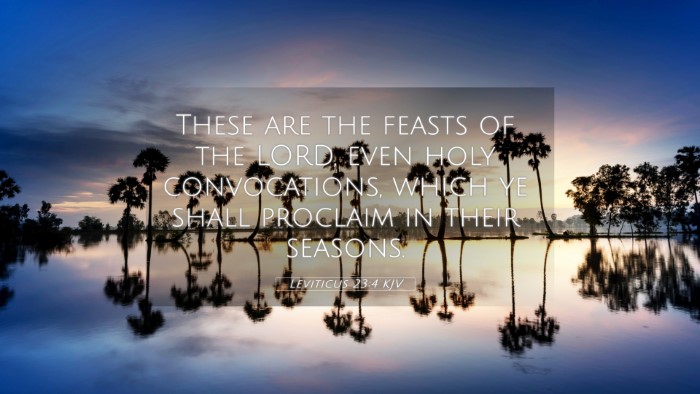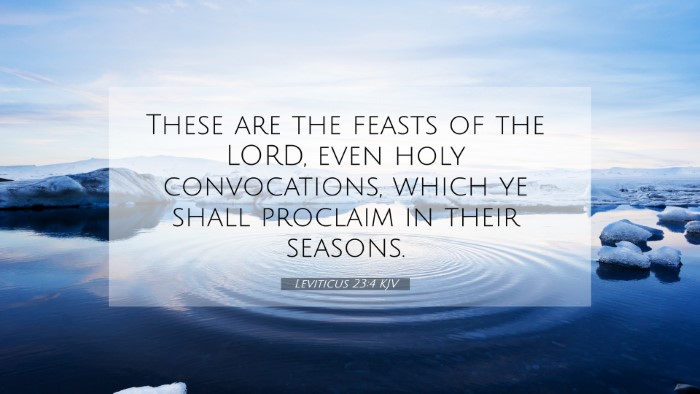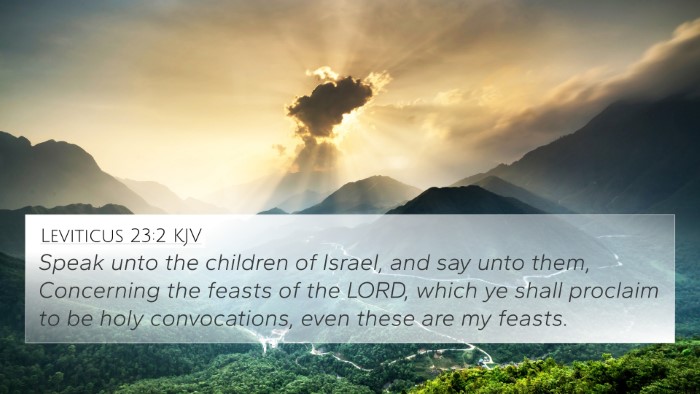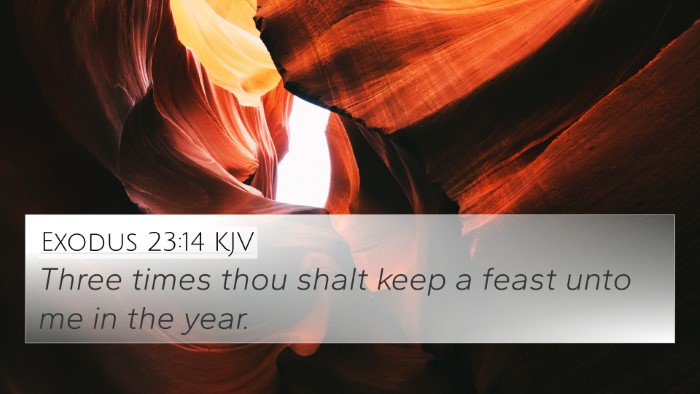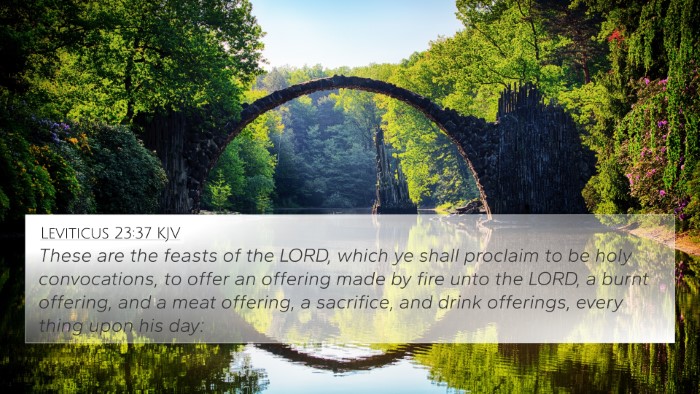Understanding Leviticus 23:4
Verse: "These are the feasts of the LORD, even holy convocations, which ye shall proclaim in their seasons."
Summary of Leviticus 23:4
Leviticus 23:4 serves as a declaration of the appointed feasts of the Lord, emphasizing their significance as holy gatherings and the importance of observing them in their proper seasons. This verse establishes a framework for understanding the religious calendar of Israel, linking each festival to a time of communal worship and remembrance.
Commentary Insights
Insights from reputable biblical commentators shed light on the meaning of this verse:
-
Matthew Henry:
Henry emphasizes that the festivals are not merely rituals but are meant to bring God's people together in remembrance of His work and provision. His commentary reflects on the themes of obedience and communal unity that arise from these feasts.
-
Albert Barnes:
Barnes highlights the idea of "holy convocations," indicating the sacred nature of these gatherings. He notes that the feasts serve to instruct the people in their faith and devotion to God, fostering a deeper communal and individual relationship with Him.
-
Adam Clarke:
Clarke explains the historical context of these feasts, noting their roles in both agricultural and spiritual life. He reflects on how observance of these festivals helped Israel remember their identity and history, especially during times of harvest.
Bible Verse Cross-References
Leviticus 23:4 can be intricately linked to several other scriptures, illustrating the interconnectedness of biblical texts:
- Exodus 12:14: Discusses the Passover, highlighting God's deliverance of Israel, a theme echoed in many of the feasts.
- Deuteronomy 16:16: Commands the Israelites to appear before the Lord during these feasts, reinforcing communal worship.
- Numbers 9:2-3: Encourages the observance of Passover at its appointed time, emphasizing the timing aspect noted in Leviticus 23:4.
- Isaiah 1:13: Warns against insincere worship during designated feasts, adding a cautionary perspective to their observance.
- Hebrews 10:24-25: Highlights the importance of gathering together, which resonates with the call for holy convocations.
- Matthew 5:17: Jesus' fulfillment of the Law, including the feasts, enhancing the understanding of their spiritual significance.
- Colossians 2:16-17: Speaks of feasts and holy days as a shadow of things to come in Christ, linking the Old and New Testament themes.
Connections Between Bible Verses
The connections between these verses can be explored through these themes:
- Celebration of God's provision and deliverance.
- The communal aspect of worship and remembrance.
- Insights into the importance of timing in worship.
- Warnings about the authenticity of worship practices.
- Fulfillment of Old Testament law in Christ.
- Interconnectivity of sacrificial themes throughout scriptures.
Thematic Bible Verse Connections
The thematic connections between Leviticus 23:4 and other verses illuminate various aspects of faith:
- Salvation and Deliverance: The consistent theme of being called out as God’s people.
- Worship and Community: The importance of gathering for spiritual growth and accountability.
- Obedience and Remembrance: God’s call to remember His works through designated times.
- Future Fulfillment: Understanding how Old Testament practices carry forward into New Testament teachings.
Cross-Referencing Bible Study Methods
For those interested in deeper study, here are some tools for Bible cross-referencing:
- Bible concordances for word searches.
- Cross-reference Bible study guides that explore themes and connections.
- Studying the structure of biblical books for inter-Biblical dialogue.
- Utilizing comprehensive Bible cross-reference materials to enhance understanding.
Identifying Connections Between Old and New Testament
Not only does this verse tie into the Old Testament themes, but it also establishes connections with the New Testament:
- Understanding the importance of the Lord's Supper as a fulfillment of Passover themes.
- Linking festival observance to the teachings and practices of Jesus and the apostles.
- Recognizing how the observance of these feasts encourages Christian unity in the body of Christ.
- Exploring how Paul’s letters reference Jewish laws and traditions while establishing a new covenant.
Conclusion
Leviticus 23:4 serves not just as an instruction but as a profound reminder of God’s desire for His people to gather in worship, reflect on His deeds, and remember their identity. Through the cross-referencing of Bible verses, we can appreciate the rich tapestry of themes that run throughout Scripture, enhancing our understanding of both the Old and New Testaments.
